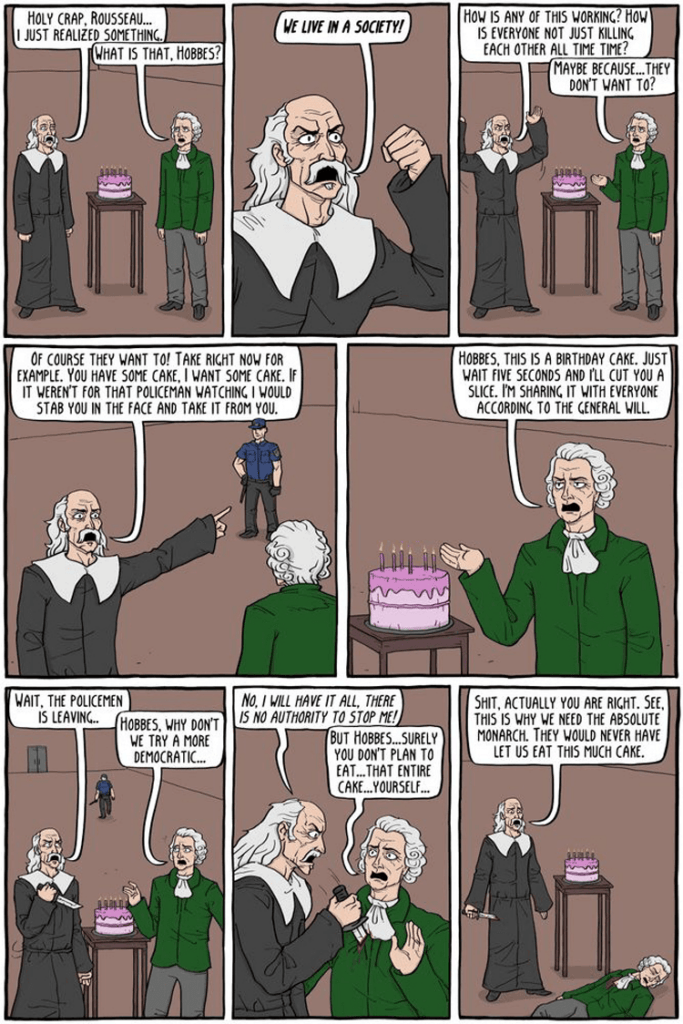
Existential Comics, which just celebrated its tenth year, continues the birthday festivities with this contrast of Jean-Jacques Rousseau and Thomas Hobbes.
It’s not a ground-breaking comparison. I think most courses in political science that delve in classical sources make a point of having students read, and discuss, both men, as we did in college.
But we also had a course in which we read Rousseau along with Ruth Benedict’s Patterns of Culture, which, rather than sparking the usual debate over generosity vs selfishness, demonstrated the difference between sitting in your study imagining what the Carib Indians might be like and actually going and finding out.
Benedict didn’t actually study the Carib, but neither did Rousseau, and Benedict did get off her duff and find out what she was talking about before putting pen to paper.
We were led — if not “taught” — to view Rousseau and his fellow philosophes as interesting thinkers but perhaps dilettantes, while Hobbes was no more experienced, simply taking his Deep Thoughts in a more cynical direction.
By the time we got to Locke and Paine and the Founders themselves, we’d learned to take it all with a grain of salt and try not to be either too naive or too cynical ourselves, though there was little they could do to keep college students from taking themselves way too seriously.
Most of us learned, upon graduation, that there was never a lively job market for Philosopher Kings, not when Plato was writing the Republic nor at any time since, while the rest of us — as Plato did — found ways to make a living through public pondering.
The only diplomatic way to segue from that into today’s look at political cartoons being to start with one that I quite admire.
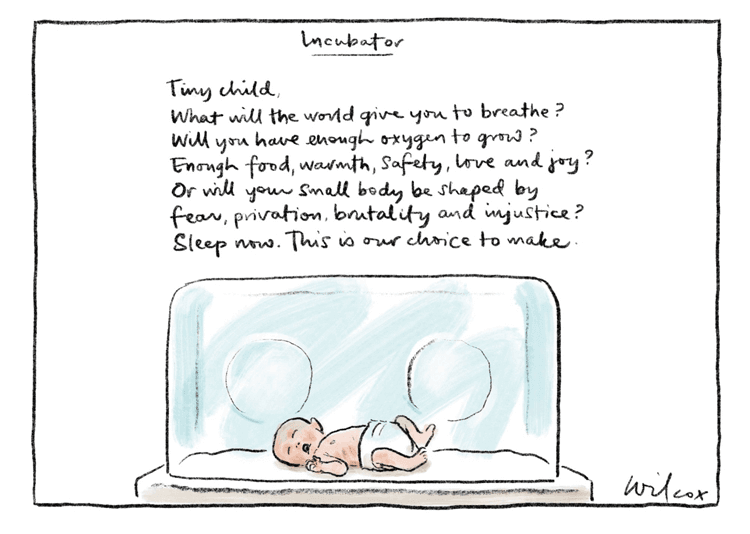
Cathy Wilcox has not, so far as I know, gone to Gaza to visit premature babies in their incubators, but this reflection upon them seems well-grounded, particularly since it is not specifically about the premies who have been in the news these past few weeks.
All babies are helpless to direct their fortunes and live at the mercy of their parents and their societies. You may sit in your study and ponder what it all means, but Jesus encapsulated it by declaring that those who misdirect children might just as well tie a millstone to their necks and leap into the waters, given how they have managed to poison their own souls.
Whether there is a difference between being a too-optimistic Rousseau or a too-cynical Hobbes, when you provide any sort of guidance, to children or adults, you place yourself under an obligation to at least be honest, which you can control, if not wise, which may be beyond your capacity.
And I’ve just written myself back into a place where whatever I say next will not flatter, but wotthehell, journalists are not supposed to have friends.
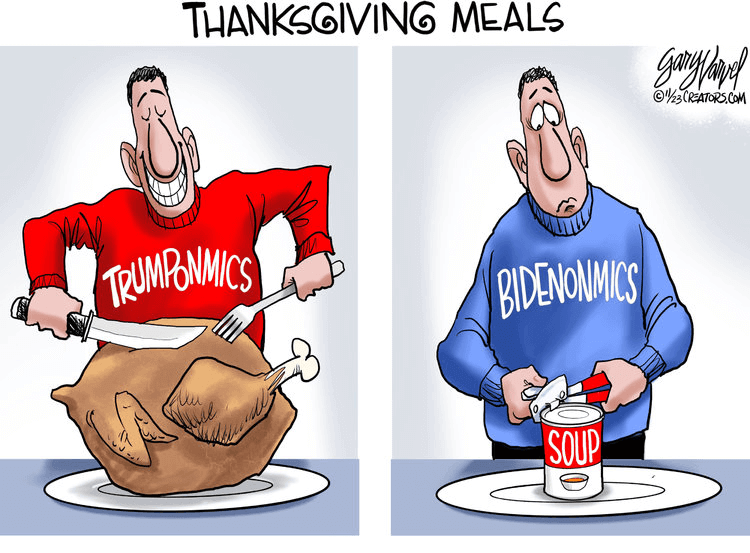
So we’ll tackle an easy one, because Gary Varvel (Creators) is making a statement that’s mostly beyond his own opinion and so can be fact-checked.
If you declare that the Trump administration created an economic boom, you get into the weeds of arguing whether it was their actions which did well or if they inherited a strong economy from Obama, who, it should be remembered, had inherited the economic disaster of 2008 from George W. Bush and had to resuscitate things.
And, as with most economic theory, it’s possible to defend either side of the argument because it’s all theoretical and involves way too many variables.
However, this source and this source and that source all agree that Thanksgiving dinner this year is less expensive than it was a year ago. That doesn’t let Biden off the hook entirely, but makes it fatuous to bring up the cost of Thanksgiving dinner as a refutation of his economic policies, since they seem to be working, however gradually.
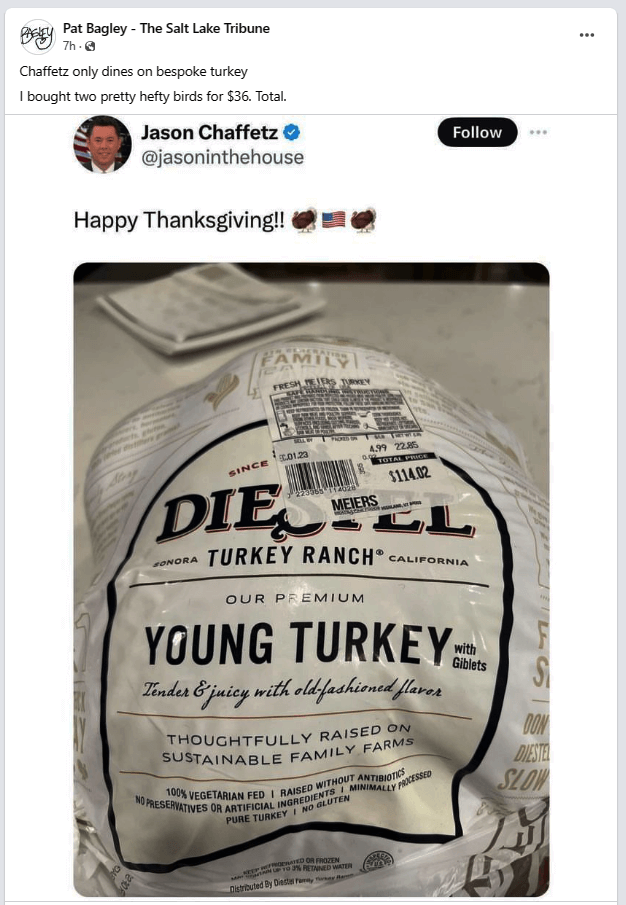
And if Varvel is on doubtful but marginally acceptable grounds, Pat Bagley is correct to mock Fox News bloviator Jason Chaffetz for, as the Daily Beast put it, buying “the Rolls Royce of turkeys” at $4.99 a pound and holding it up as an example of how normal people are suffering.

As it happens, I recently got my weekly flyer from the grocery store.
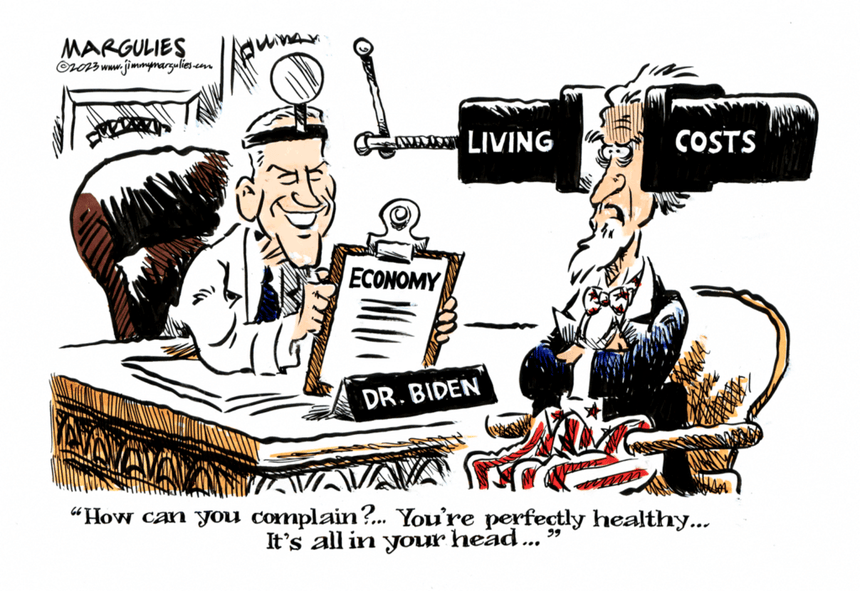
Jimmy Margulies is correct that the cost of living is higher than it was four years ago,

It would be surprising if it weren’t, the issue being not the Consumer Price Index itself but a dip in real household income, which falls into that category of things you can pointlessly argue over, starting with the impact of the pandemic and who did what to deal (or not deal) with that.
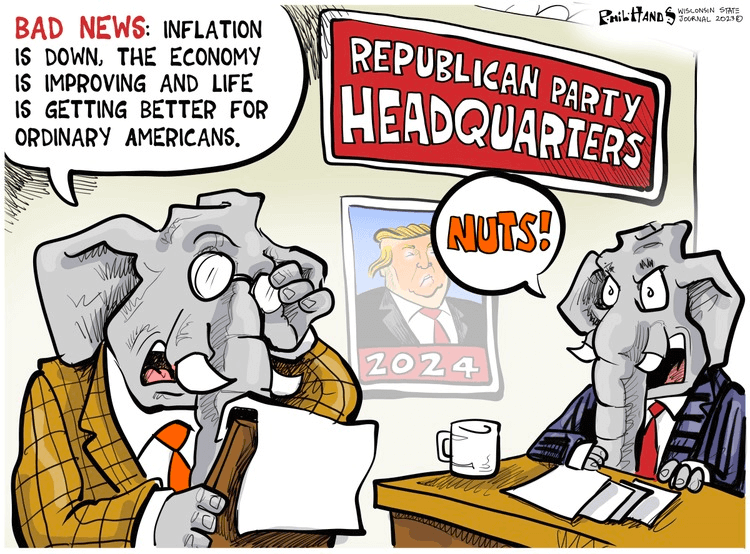
The bottom line — philosophically, not economically — being, as Phil Hands points out, that things are looking up, and that the opposition’s political success will depend largely on keeping public perception mired in the world of poor, poor pitiful me, since people vote on what they think is going on, rather than going into the field and researching it.
Math class, as Barbie noted, is tough!
Juxtaposition of the Day
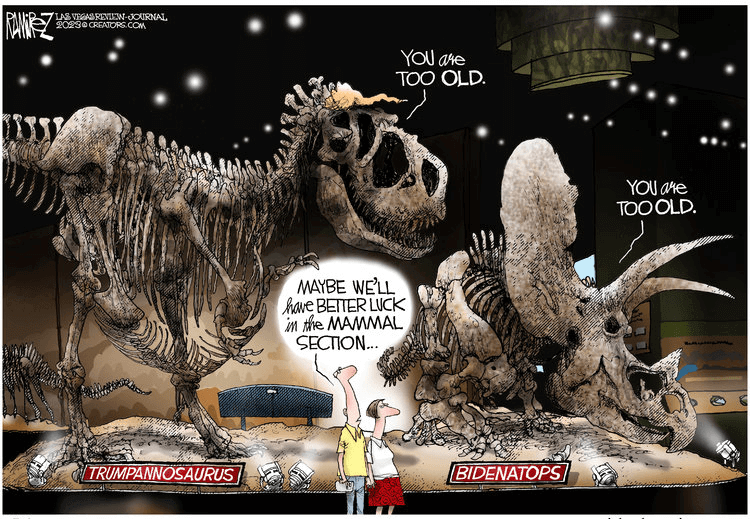
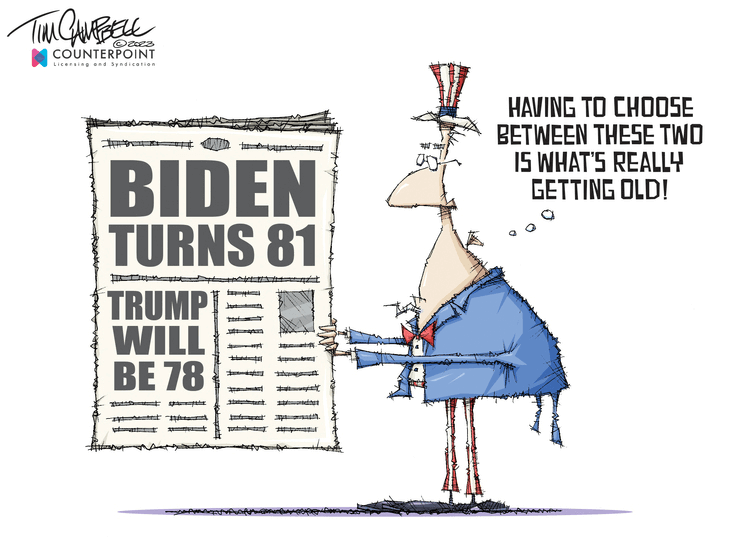
Kudos to both cartoonists for noting that there’s little difference in age between the two prospective candidates for president in 2024.
The question is what is to be done about it at this stage, and that’s one where sitting around pondering is particularly useless, because neither party has anyone in the 45-60 age bracket within hailing distance of the nomination. Nobody is genuinely challenging Biden, while the people allegedly challenging Trump seem frightened to criticize him.
Juxtaposition of the Day #2
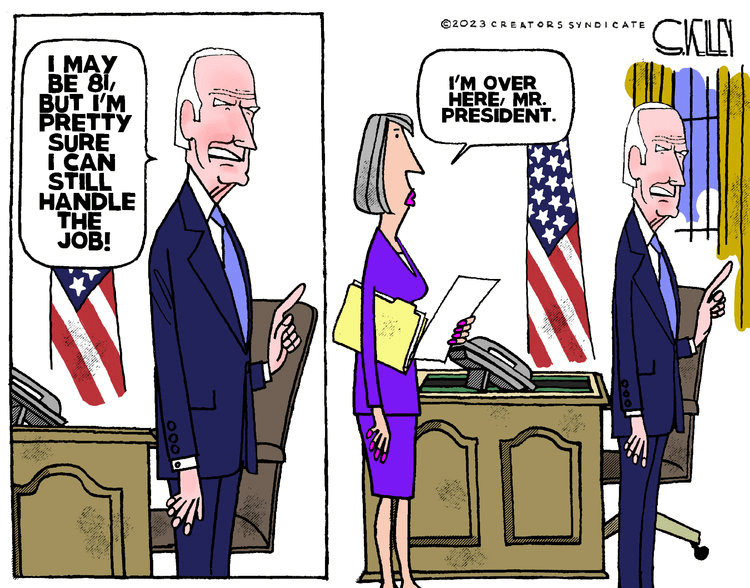
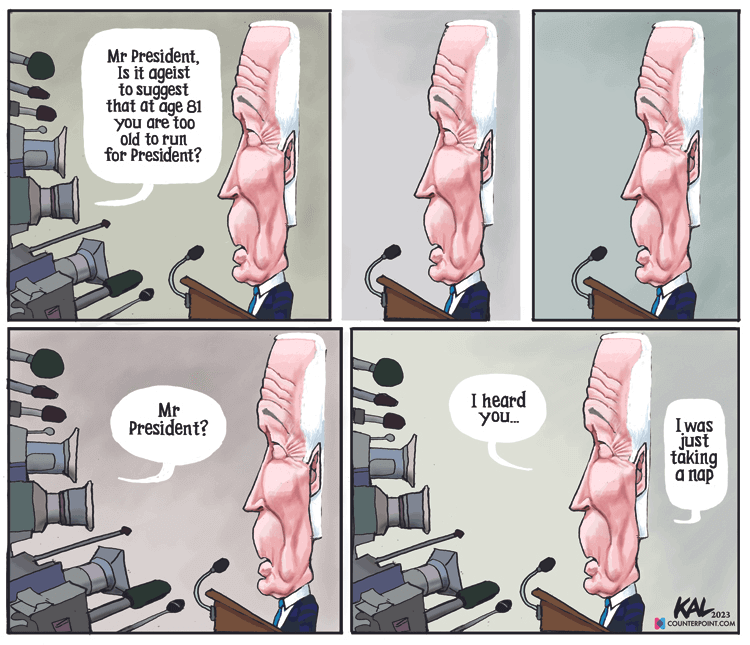
Kevin Kallaugher — Counterpoint
Conservative editors will, no doubt, get a kick out of these cartoons, but it sure seems a lot more like Rousseau pondering what he’s heard about the Carib Indians than Ruth Benedict trekking into the wilds to find out what the people she writes about are truly like.
There are cartoons, of course, that make hay over Trump’s absurd blunders and, lately, his hopes to establish a dictatorship. But those are Ruth Benedict-style cartoons, because he’s actually said those things.
If we keep promoting popular perceptions instead of researching actual facts, we may find ourselves in a Hobbesian nation, and not the stuffed-tiger type but the kind we once thought was confined to Mississippi.
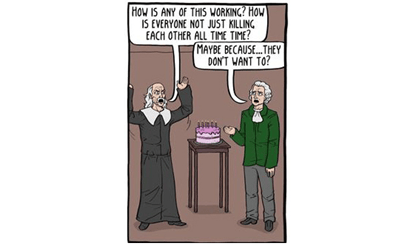
Hi Mike. 2008, not 1980. Right?
Yeah, I knew there was an 8 in there somewhere. Fixed, thanks.
That’s what I thought.
On Kelley – Oh! So that’s what Helen Kudlick does for a living!
When I worked as the staff editorial cartoonist for the San Francisco Examiner (a conservative newspaper which later folded into the S.F. Chronicle), I had to back up my cartoons to my editor with facts, which was usually on the front page of the paper that day or the day before. Apparently this nuisance of backing up opinions with facts is a thing of the past…which makes such works like Mr. Varvel’s cartoon nothing more than propaganda. As for the ageist cartoons presented here, they are all just going for a cheap laugh, not making any point…other than Biden and Trump are old…rather than dealing with what each brings to the table (you know…facts) and what their separate agendas are for the future. But editors want funny cartoons, not actual editorial cartoons. Editorial cartoonists have been feeding this troll for decades now instead of doing their damn job…visually editorialize, backed with facts.
The tension between, on the one hand, trying to be insightful, and on the other hand, being funny, goes back a very long time — “decades” might even be underestimating it. You can end up, going in one direction, with editorial cartoons like Winsor McCay’s; beautifully drawn, consistent with the editorial line, but as weighty as a plaster of Paris souffle. I’m not sure how many people want to see the visual equivalent of a Walter Lippmann column. Bernard Partridge’s cartoons for Punch from the Edwardian era to World War II are actual editorial cartoons representing the magazine’s line, though in many ways their sheer ponderousness tells against them, in the long run. Of course, you can go the other way, with editorial cartoons morphing into gag-a-day cartoons. To a certain extent, much as I love his work, Mike Peters’ cartoons went in that direction (and he did a lot of ageist cartoons on Reagan). Or you can have someone deliberately pull their punches to be nice, something that the Washington Star boasted about with Clifford Berryman’s editorial cartoons. David Low, when he joined the Star in London just after World War I, experienced something of this, when he was billed as “Laugh With Low,” to play off “Smile With Poy,” light-hearted editorial cartoons done by a rival for another newspaper. While Low was capable of being very funny (especially in his later Low’s Topical Budget bits done for the Evening Standard), he certainly wasn’t a laff riot. So: what is the job of an editorial cartoonist? Is it to get the point across with a smile, or with a drawn dagger? One can make a case either way.
Pretty sure it’s Mitch who freezes up during press conferences, but whatever makes you feel better I guess…
I’m especially disappointed that “KAL” would be lazy enough to go with such a cheap ageist joke. He is too wise and talented.
I say, too many turkeys all year ’round and too few facts all year ’round. Wiley Miller said it well, too.
I know your graphs are correct. But, again, they are generalities. Too many people I know are working at jobs with unlivable wages. And, our retirement income is limited to microscopic cost-of-living increases that NEVER keep up with our actual cost-of-living increases. We buy an inexpensive whole chicken, not a ‘gold plated $4.99/lb turkey’. Seems too many people are figuratively buying an ideological ‘gold plated turkey’. (end of rant)
And, in the presidential ‘race’ age is a smoke screen in which too many people seem caught. But, the duopoly dooms us to the ‘lesser of two evils’ decision every time.
A grocery store in my neighborhood is advertising turkeys for $1.29. Not per pound, $1.29 for a turkey.
The popular perception that age is absolute and one 80-year old is as mentally and physically as old as the next is largely due to repetitive shoits by alleged comedy writers who are too dimwitted to believe that age is the sole thing they can use to comment on “politics.” Tune in a network talk show or SNL in 2023-24 and take a drink for each age joke and you’ll be drunk in minutes. When your political views are based only on non-news platforms it’s your “perception.” (It doesn’t help that the news channels have to echo the fatuous views of the newest polls based, as Mike has pointed out, by idiots who need to answer unsolicited calls on their cell phones. (People with landlines without caller i.d. have no choice.)
Re: the feeling that prices are higher than ever, well, that’s how inflation works. Even if it’s 1%, unless a huge number of workers see sudden decreases in their wages, it’s inevitable that the price of Cheerios will be more than it’s ever been before. So what? Most people are making far more than they used to if they’ve retained their jobs for any length of time. Prices are up because your income is up. Your “feeling” doesn’t have anything to do with it. Graphs like the above are highly subjective because your baseline is always more personal than can be shown. If you were jobless last year without unemployment insurance and have a job this year, your personal inflation rate is 100%. Congratulations, you’ve outpaced the consumer price index. If you can’t find a job in today’s job market, it’s largely a personal choice, and in my own case, I’m doing so much better in retirement than I was doing in the Trump years that I can’t relate to anybody’s “perception” of the current economy. And I’m certain that has a lot to do with being a Democrat during a Democratic administration.
Speaking of age, Mick Jagger (8o) and the boys, Keith Richards (79) and Ronnie Wood (76) are hitting the road this year to promote The Rolling Stones’ new album “Hackney Diamonds.” Further, Paul McCartney (81) and Ringo Starr (83) are still active. I haven’t heard too many people crying out that the above artists should give up their careers just because of their age.
On a model train forum I follow, someone posted a link to an inflation calculator, https://www.usinflationcalculator.com/
Their goal was to show that modern prices for train stuff is not out of line with historical prices.